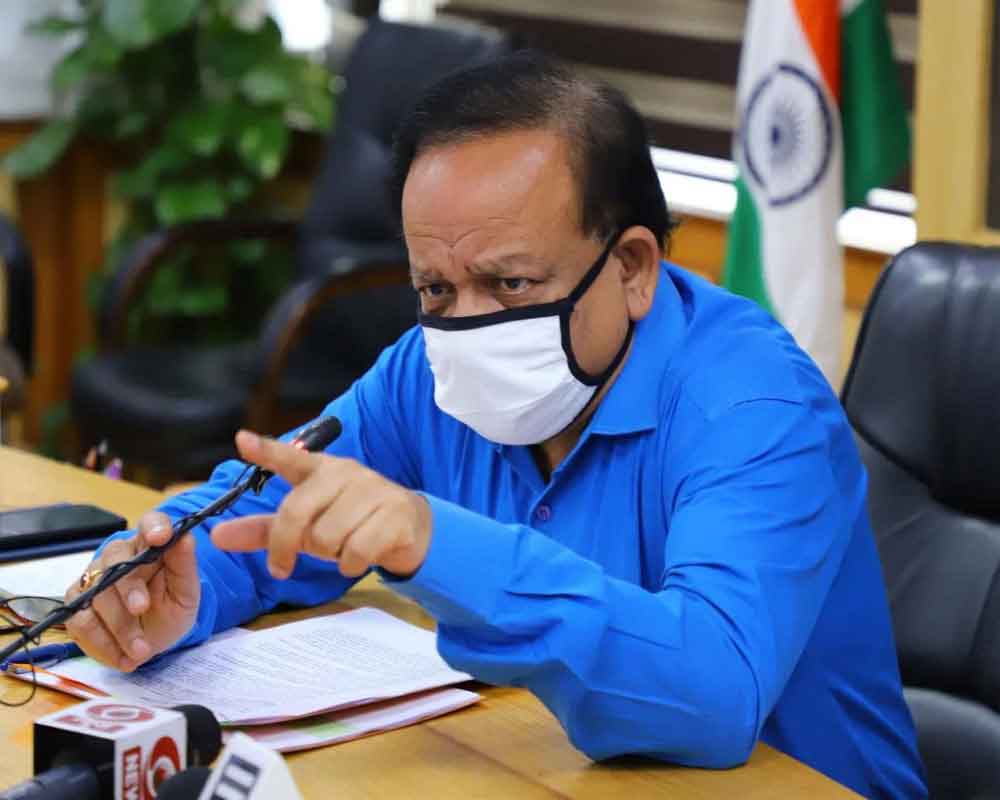Union Health Minister Harsh Vardhan on Wednesday said the country's policy of micro-identification, mass isolation and quick treatment helped prevent large scale deaths and spread of COVID-19.
He said 1.35 billion Indians honoured the decision of nationwide lockdown that helped keep the mortality rate down and contained the spread of COVID-19 so far.
Addressing the Non-Aligned Movement (NAM) Health Ministers' meeting through video conference, Vardhan stressed that human welfare must be the basis of all economic growth.
The meeting was chaired by Ogtay Shiraliyev, Minister of Health, Republic of Azerbaijan, the Union Health ministry said in a statement.
Vardhan said the present COVID-19 pandemic crisis also reminds the people that the global institutions of governance need to become more democratic, transparent and representative to be credible and effective.
A reformed multilateralism is the need of the hour, he said.
"Our Prime Minister Narendra Modi has ensured speed, scale and determination in the handling this crisis.
"Armed with a political will to ensure that we defeat this dreadful disease, 1.35 billion Indians came together to honour the decision on nationwide lockdown that have kept our mortality rate down and contained the spread of the disease," the statement quoting Vardhan said.
"Our policy of micro-identification, mass isolation and quick treatment reaped good dividends in preventing large scale spread and deaths due to COVID-19," he said.
The NAM summit is being organized at a time when the international community is faced with a pandemic which has disrupted lives and livelihood of millions of people around the world.
The NAM expressed its concern at the global threat posed by COVID-19 and resolved to fight it with proper preparedness, prevention, resilience-building, and greater national, regional and international collaboration, the statement said.
Offering his condolences to families across the world who have lost their loved ones to this deadly disease, Vardhan said, "COVID-19 has made us realize that we are more interconnected and interdependent than ever before.
"It has made us realize that the man-made challenges that our planet faces today - such as climate change and public health emergencies - can only be faced together, not when we are divided. It requires collaboration, not coercion."
In India, the health minister said, the government swung into action and added capacity in terms of infrastructure as well as manpower.
With a fleet of 10,000 dedicated COVID hospitals and Care Centers and a trained healthcare workforce of over two million, there was no looking back, he said, adding that India took every possible step to ensure that it contains the spread of the virus.
"We also ensured that focus on COVID-19 should not mean neglect of patients of other diseases," he stressed.
Along with taking care of its citizens, India also extended help to other countries, Vardhan said, adding that it has promoted coordination to counter coronavirus and organized capacity building by sharing its medical expertise with the neighbouring countries.
"India is living up to its reputation as the pharmacy of the world, especially for affordable medicines," he said.
Vardhan said besides meeting the domestic needs, India has provided medical supplies to over 123 partner countries, including 59 members of NAM. The country is also taking active part in the global efforts to develop remedies and vaccines, he said.
"As developing countries, it is our people that stand to be the most profoundly affected by these changes. We must all realize that our destinies are linked like never before," he said, seeking constructive deliberations, cooperation and collaboration in the spirit of solidarity and fraternity that characterizes NAM.
Acknowledging the contribution of the frontline workers, Vardhan said, "Let us all stand up to clap for all frontline COVID warriors - our doctors, our nurses, our paramedics, our sanitation and security staff, our army, police and paramilitary forces, our journalists, all those who are putting their lives at risk for us, and for their families who are sending their members to the battlefield with all the risks.
"They have taught us a lesson, and that lesson is to never forget that human welfare must be the basis of all economic growth," he said.




















